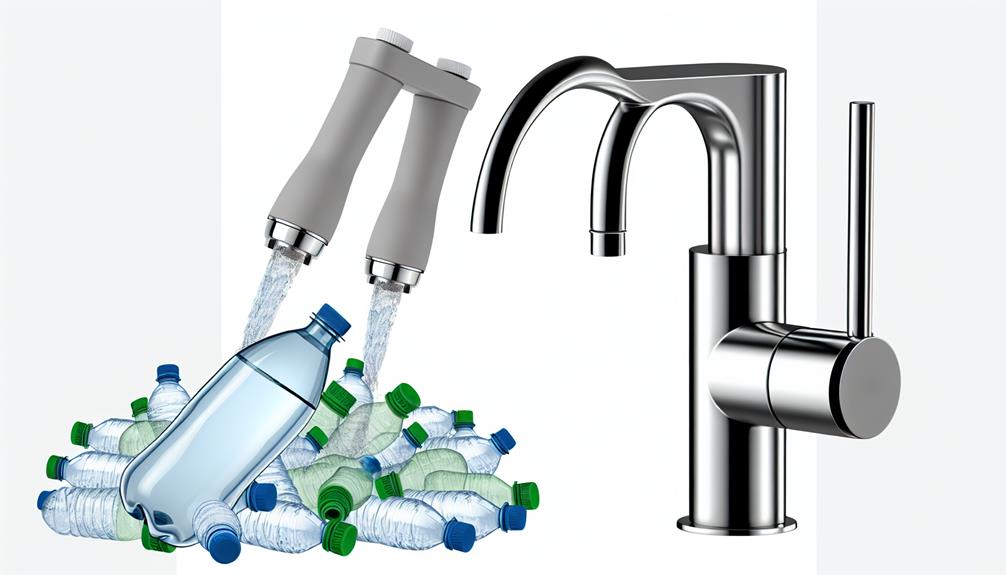While you're making efforts to reduce your carbon footprint, you may not have considered the impact of your water filtration system. You're likely aware that ditching plastic bottles is a positive step, but the type of filters you use at home can further streamline your sustainability goals.
As you seek out ways to live more responsibly, it's crucial to examine the hidden carbon costs in everyday items. Among the myriad options, three types of filters stand out for their low environmental impact: activated carbon filters, ceramic filters, and reverse osmosis systems. Each offers unique benefits that not only ensure the purity of your water but also contribute significantly to energy savings and waste reduction.
To discover how these systems can align with your eco-conscious lifestyle, consider the subtle yet profound ways they can help you minimize your ecological footprint.
Activated Carbon Filters Efficiency
Activated carbon filters play a pivotal role in reducing environmental impact by efficiently removing contaminants from water through a process known as adsorption. You'll find that these filtration systems are central to an eco-conscious lifestyle, aiming to reduce carbon footprints. The use of coconut shell carbon blocks, sourced from renewable materials, enhances the environmentally friendly nature of this filtration technology. Not only do they offer a sustainable alternative, but they also avoid the pitfalls of plastic waste, aligning with a broader initiative to reduce plastic in our ecosystems.
As you delve into the technicalities, it's clear that activated carbon filters are designed to tackle a broad spectrum of common contaminants found in water. Their adsorptive capability means that harmful elements are effectively trapped, ensuring that the filtration process is thorough. It's worth noting that the efficiency of these filters doesn't wane quickly. They're built to last, typically requiring replacement only every six months to a year, which stands testament to their sustainable design.
Choosing an eco-friendly water filter like activated carbon filters directly contributes to a more sustainable future. Not only do they lessen the load on the environment, but they also ensure that you're part of the solution to reduce carbon emissions and promote healthier ecosystems.
Ceramic Filters Sustainability
Ceramic filters, with their ability to be washed and reused, represent a sustainable water filtration solution that significantly lowers your carbon footprint. These eco-friendly alternatives seamlessly integrate into your sustainable lifestyle, contributing to a marked reduction in environmental impact. Unlike single-use pitcher filters, ceramic filters boast a longevity that diminishes the need for frequent replacements, effectively reducing waste and conserving resources.
Delving deeper into the technicalities, ceramic filters' micro-porous structure, capable of filtering particles as small as 0.5 microns, enhances water quality by eliminating debris and reducing the presence of harmful heavy metals. This level of filtration isn't only essential for maintaining health but also for preserving the environment by minimizing the release of contaminants back into the ecosystem.
The sheer durability and effectiveness of ceramic filters sustainability make them a standout among the home water filtration options available. By prioritizing these systems, you're actively reducing energy consumption. Their reusability translates into fewer manufacturing demands and a lower overall carbon footprint.
As you weigh your choices for water filtration systems, consider the enduring benefits of ceramic filters: they're a testament to the power of combining technology with eco-consciousness to forge a path toward a cleaner, greener future.
Reverse Osmosis Energy Savings
While ceramic filters offer a sustainable choice, exploring the energy savings of reverse osmosis systems unveils another layer of eco-efficiency in water purification. Reverse osmosis systems are adept at minimizing energy use while providing clean drinking water. Unlike conventional water filtration options, these systems filter water in at least three stages, ensuring the removal of total dissolved solids and other contaminants.
The design of reverse osmosis systems has a significant impact on their ability to reduce waste. They use the incoming water pressure to assist in washing contaminants away, which means less energy is required to maintain the filtration process. Additionally, the incorporation of a permeate pump in systems like the Everpure MRS-600HE High Efficiency Reverse Osmosis and Pentair FreshPoint GRO-575M 5-Stage Monitored Reverse Osmosis System enhances filtration efficiency. This not only cuts down on the energy consumed but also reduces the volume of wastewater produced.
Moreover, these environmentally friendly reverse osmosis filters contain significantly less plastic compared to traditional filters, making them a more sustainable water filtration solution. They can be disposed of safely, mitigating the environmental burden. By choosing such systems, you're not just securing clean drinking water but also contributing to a lower carbon footprint.

